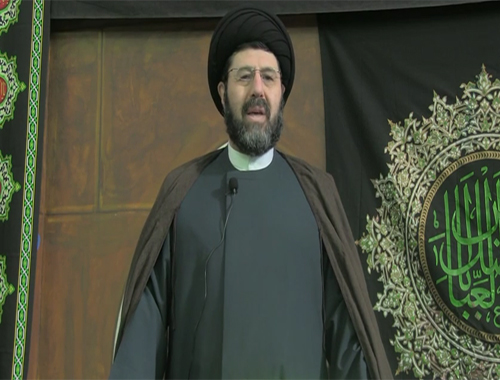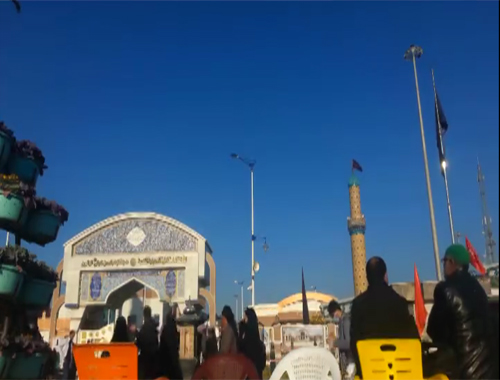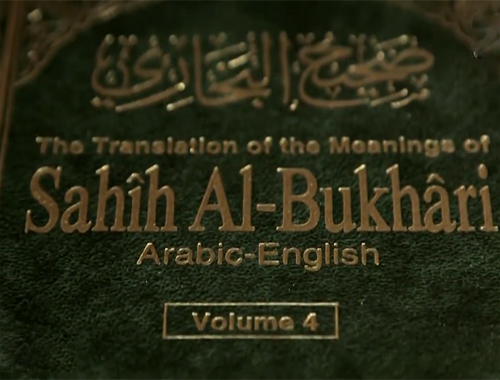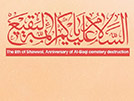Verses 6-11
- Details
- Hits: 2553
Sura Duha
(The Glorious Mornings Light)
No. 93 (Verses 6-11)
(6)أَلَمْ يَجِدْكَ يَتِيمًا فَآوَى
(7)وَوَجَدَكَ ضَالًّا فَهَدَى
(8)وَوَجَدَكَ عَائِلًا فَأَغْنَى
(9)فَأَمَّا الْيَتِيمَ فَلَا تَقْهَرْ
(10)وَأَمَّا السَّائِلَ فَلَا تَنْهَرْ
(11)وَأَمَّا بِنِعْمَةِ رَبِّكَ فَحَدِّثْ
6. Did He not find you an orphan and sheltered (you)?
7. And He found you wandering and guided (you).
8. And He found you in need and made you free of need.
9. Therefore treat not the orphans with harshness,
10. And for (he one who asks, repulse not,
11. And as for the Bounties of your Lord, do proclaim (it).
Commentary:
As a Sign of Gratitude for the Bounties of Your Lord....
As we mentioned before, the Sura mostly tends to comfort the Prophet (p.b.u.h.) and enumerates the Divine graces granted to him. Then, in relation to the former verses containing this very meaning, the folIowing verses begin by mentioning three particular blessings of Allah's Bounties to the holy Prophet (p.b.u.h.); and along with them it gives him three important instructions:
Did He not find you an orphan and sheltered (you)?
'(o' Mohammad) you were in your mother's womb when your father, 'Abdullah, died. I caused you to be raised in the lap of your grandfather ('Abdul-Muttalib).
'You were six years old when your mother died and you, from this point of view, became lonely, but,I increased the love for you in the heart of your uncle ('Abu-Talib)'.
'You were eight years old when your grandfather, 'Abdul-Muttalib, died', 'I appointed your uncle to serve you and support you and he showered you with love and care in protecting you'. 'Yes, you were an orphan and I sheltered you'.
Some commentators have cited many other meanings about this verse that are not compatible with its appearance. For example, the meaning of orphan, here, is said to be a person who is unique in grace and holiness just as a unique piece of jewelry is called 'an orphan jewel'. According to this idea the meaning of this verse would be, 'Allah found you unique in grace and honour, therefore, He selected you and gave you the prophethood'.
Another meaning is that: 'You, yourself, were an orphan one day, but, We selected you to be a protector of orphans and a leader for mankind '.
Without doubt, the first interpretation is the most appropriate in every respect and is more harmonious with the content of the verse.
* * * *
Then, attention is paid to the second blessing and says:
And He found you wandering and guided (you).
'Yes, you were not acquainted with prophecy at all and it was Us Who enlightened your heart with a Light by which you could guide Mankind'; as, in another occasion it says: ...Thou knewest not (before) what was Revelation, and what was Faith, but We have made the (Qur'an) a Light, wherewith We guide such of Our servants as We will... (Sura Shura No. 42, verse 52).
It is clear that before receiving his prophetic mission. the holy Prophet (p.b.u.h.) lacked this Divine emanation. Allah helped him and guided him, as Sura Yusuf, No, 12, verse 3 says: We do relate unto thee the most beautiful of stories, in that We reveal to thee this (portion of) Qur'an: before this, thou too were among those who knew it not..
Surely, if Allah had not helped the Prophet (p.b.u.h.) with His hidden assistance in guiding him, he would have never succeeded on the path to his goals.
Therefore, the term /dhalalat/ 'aberration' , here, does not mean 'the absense of faith, monotheism, piety and virtue', but referring to the above verses, and accotding to the statements of many commentators, it means 'unacquaintance with the secrets of prophecy, the laws of Islam and similar facts', but,later and after being appointed to the prophetic mission, the Prophet (p.b.u.h.) learned them all with Allah's help and guidance.
In Sura Baqarah, No.2, verse 282 when stating the philosophy of severalty of witnesses for writing loan documents involving future payment, it says: ...so that if one of them errs, the other can remind.... In this verse the term /dalalat/ is used only with the sense of forgetfulness with reference to the phrase /fa#akkir/ 'then remind'.
There are additional commentaries given on the verse. For example, it means that 'you were unknown and Allah bestowed on you so many gifts of His blessings that you became quite well-known everywhere'.
Or, 'you were lost several times: Once in the valleys of Mecca when you were supported by 'Abdul-Muttalib. Another time when your nursing period had finished and your foster mother, Halimah Sa'idiyah, was taking you to Mecca to give you to 'Abdul-Muttalib, then you bccame lost on the way. And, the third time when your uncle was going to Sham (Syria) in a caravan and you were with him, and you lost the way in the dark of night. Allah guided you, on all occasions, and led you either to your loving grandfather or uncle'.
It is worthy to note that the term /dhal/, from the point of terminology, has two shades of meaning: 'lost' and 'misled'. For instance, it is said : 'knowledge is the lost item of a believer' (meaning that a believer is always searching for more knowledge). And, thus, it is also used with the meaning of 'hidden' and 'absent', as: ...What! when we lie, hidden and lost, in the earth, shall we indeed be in a Creation renewed? Sura sajdah, No. 32, verse 10).
If the word /dall/, mentioned in the verse under dicussion, is used with the meaning of 'lost', or if it means 'misled' or 'astray', the purpose is that the path of prophecy was out of his reach before his appointment or, in other words, the Prophet (p.b.u.h.) had nothing from his own and what he had was from Allah Thus, there will be no problem in using either term.
* * * *
Then, referring to the third blessing, it says:
And He found you in need and made you free of need
'Allah attracted the attention, to you, of that sincere pious lady, Khadijah, so she could give you all her wealth to use for your great and holy aims on the way of Islam. And, later, at the time of the glory of Islam, He paved the way for you to reach abundant riches through wars, enabling you to become independent in attaining your great goals.'
On commenting about these verses, there is a tradition from Imam Ali-ibn Musa-r-Riza (p.b.u.h.) who said: Did He not find you an orphan or a unique person among His creatures and sheltered people with you; and He found you wandering or unknown among the people who did not know your greatness and then He led them to you; and He found you as a custodian for them from the point of knowledge and made them free of need by you?. (1)
This tradition, ot course, refers to the hidden meaning of the verse, otherwise the outward appearance of it is the very same that was said in the above.
We should never think that by making the above comments, which are understood from the appearance of the verses, that it would decrease the high value of the Prophet (p.b.u.h.), or that it is a negative idea from Allah about Mohammad (p.b.u.h.). On the contrary, it is, indeed, the statement of His grace and respect towards the holy Prophet (p.b.u.h.) which refreshes his great soul.
* * * *
With the conclusion of the previous verses, the next verses command the Prophet (p.b.u.h.) with three important instructions. Although they are directly addressing Mohammad (p.b.u.h.), they are surely applied to everyone. At first, it says:
Therefore, treat not the orphans with harshness,
The term /taqhar/ is based on /qahr/ and, as Raqib cites in his book, Mufradat, it means 'prevalence with contempt'. But, the term is used with either of these two senses, separately, and, here, 'contempt' seems to he more fitting.
This shows that in relation to orphans, even though feeding and donating are considered highly commendable actions, it is more important to respect them and to be kind and spiritually helpful to them, or to satisfy their emotional needs. That is why it is narrated in a tradition from the Prophet (p.b.u.h.) that he said: He who touches an orphans'head, affectionately, Allah will bestow on him as many rays (of blessings) on the Day of Final judgement, as the number of the orphans' hair which touch under the person's hand.
It seems as if Allah is telling the Prophet (p.b.u.h.) that 'you, yourself, have been an orphan and suffered from the pain of orphanhood. Now, be careful of the orphans with all your heart and treat them with tender affection and respect, and quench their thirsty souls with kindness'.
* * * *
In the next verse another command is presented:
And for the one who asks, repulse not,
The term /tanhar/ is derived from the root /nahara/ which means 'to repulse' or 'to repel by discourtesy or coldness' , and it is not improbable that its root is the same as the term /nahr/ with the meaning of 'the running stream', since it flows with violence.
In order to specify who is meant by the term /sa'il/ 'petitioner', there are several commentaries which have been put forth. It could mean:
1. Those who have some questions on scientific, religious and theological matters. This, as a subdivision, is understood from the verse: And He found you wandering and guided (you). 'Then, you, too, spread this divine guidance and tried to guide the needy and did not repulse any petitioner'.
2. Those who are in need of finance and come to you. Help them and do not make them hopeless by repelling them.
3. Those who are poor in both knowledge and finances.Allah orders Mohammad (p.b.u.h.) to respond, positively, to those who make a request of any type. This idea is fitting both with divine guidance to the Prophet (p.b.u.h.) and sheltering him when he was an orphan.
Strangely enough, some commentators, in order to prove that the term /sa'il/ 'petitioner', here, means only 'a petitioner who is asking for knowledge', have said that the term has never been used in the Holy Qur'an with the sense of 'financial help'. (2)
But, it has frequently appeare d in the Qur'an with this meaning, such as Sura Zariyat, No. 51, verse 19: And in their wealth and possessions (was remembered) the right of the (needy) him who asked, and him who (for some reason) was prevented (from asking). Also, from Sura Ma'arij, No. 70, verse 25 and Sura Baqarah, No. 2, verse 177 are other examples containing this idea.
* * * *
Finally, in the third and last command, it says:
And as for the Bounties of your Lord, do proclaim (it).
Announcing the bounties is sometimes done by statements, containing thankfulness and gratitude and that is far from pride and haughtiness, and sometimes by action through donation and charity from those bounties, on the path of Allah, in a way that shows He has given him much Bounty.
This is the style of generous, noble people that when a blessing befalls them they proclaim it and thank Allah and their behavior also confirms and reinforces this fact. On the contary, the jealous, begrudging, miserly persons groan and moan all the time and even if they were to get the whole world they would insist on covering over the favours; their appearance is poor, their statements are full of weeping and complaining; and their actions illustrate poverty, too.
This is when the holy Prophet (p.b.u.h.) is reported to have said:
when Allah gives a servant a bounty, it pleases Him to see the signs of the bounty on him.(3)
Therefore, the concluding meaning of the verse is that in appreciation of the fact that Allah made you free of need, bountifully, when you were in need; your duty is that you should make that Divine Bounty spread far and wide and proclaim it and share it by speech and action.'
But, some commentators have said that 'bounty', here, means only spiritual bounties, such as, prophethood and the Holy Qur'an which the Prophet (p.b.u.h.) was called to announce and spread. And this is the meaning of 'announcing the Bounty'.
It is, also, probable that it applies to all material and spiritual bounties.
So, on commenting on this verse, Imam Sadiq (p.b.u.h.) is narrated to have said: Announce them all, whatever Allah has endowed to you, from merits, sustenance, goodness, and guidance. (4)
Another tradition from the holy Prophet (p.b.u.h.), as a general admonition, says: He who is endowed a blessing and it is not seen on him, is called an enemy of Allah and an opponent to His Bounties.(5)
We conclude this subject with a tradition from Hazrat Ali (p.b.u.h.) who is reported to have said: Surely Allah, the Most Bountiful likes bounties; and also likes to see the signs of His bounties on His servants. (6)
* * * *
Supplication:
O Lord! Your Bounties are beyond what can be announced. Do not restrain them from us, and increase them with your generosity.
O Lord! We are encompassed by your grace in this world. We hope for the same in the Next World.
O Lord! Help us to be always the advocators of the deprived and the supporters of the rights of the orphans.
(1) Majma'aI-Bayan, vol. 10, p. 506.
(2) 'Abduh Commentary, section: 'Amma, p. 113.
(3) Nahj-ul-Fisahah, Tradition 686.
(4) Majma-'al-Bayan, vol. 10, p. 507.
(5) Tafsir-i-Qurtabi, vol. 10, p. 7192. A similar meaning is found in al-Kafi, vol. 6, Tradition 2.
(6) fruu'-i-Kafi, vol. 6, p. 438.
The End of Sura Duha
(The Glorious Morning Light)











